Slovakia
Factsheet
| ETHNIC MINORITIES: | |
|
Hungarian: Roma: Ruthenian/Ukrainian: |
9.7% 9.2% 1% |
| RELIGIONS: | |
|
Roman Catholic: Protestant: Greek Catholic: Muslim: |
68.9% 10.8% 4.1% 0.1% |
| NET MIGRATION: | 36,684 |
| POP. GROWTH RATE: | 0.2% |
| GDP GROWTH: | +1.5% |
| GDP PER CAPITA: | 16,847 |
| UNEMPLOYMENT: | 14.2% |
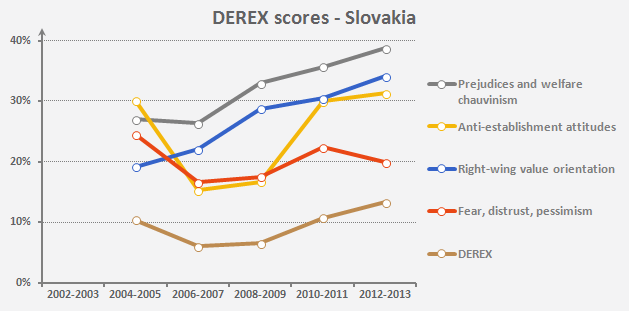

Slovak National Party (Slovenská národná strana, SNS)
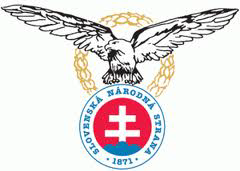
The party was established in 1990. Its strongman, Jan Slota has been notorious from the very start for his anti-Hungarian in anti-Roma diatribes. The party's philosophy is based on hatred of Hungarians fueled by revisionist fears, and is characterized by a populist exploitation of social anxiety generated by the global crisis and leading to a loss of faith in political, economic and cultural institutions. The Roma population is the primary target of its attacks. The extremist organization sent representatives to two parliaments in 1990-2002 and 2006-2012. Between 1992 and 1998 it joined two Meciar governments and in 2006, when the party sent 20 delegates to the Slovak legislature after winning 11.73% of the votes, it entered the Fico coalition. Due to the breakup of SNS, in 2002 and 2006 the party did not make it to Parliament. Its role in the government coalition in the 2006-2010 term greatly contributed to the deterioration of relations between Slovakia and Hungary, reaching a point where Slovakia refused then Hungarian president, László Sólyom, to enter its territory. In 2012 the party dropped out of the Slovak Parliament. Its current chairman, Andrej Danko, pursues the party's earlier anti-Hungarian and anti-Roma ideology. Following charges of improper management of party assets and corruption, in 2013 Jan Slota was expelled from the party.
In 2016, under Danko’s leadership, the SNS experienced a sudden rise in its number of supporters. At the general election on 5th March, the party achieved 8,64% of the votes and gained 15 out of 150 mandates in parliament. Due to the Smer losing its majority and its ability to form a government on its own, the SNS was also invited to enter into a coalition of four parties including the Smer, Most-Híd and Siet'. The party’s strong influence on legislation is expected to strengthen pro-Russian populist rhetoric in Slovak politics, legitimizing Vladimir Putin’s regime and potentially destabilizing Slovak national security. These developments are projected by the party's election campaign which consistently built upon a firm anti-EU rhetoric, attributing the conflict in Ukraine to expansionist policies pursued by the EU. Danko also insisted that the sanctions targeting Russia only served the purpose of validating the interests of the United States, whereas in reality they were 'against the Slovak national interests'.
(Last update on 4. April, 2016)
Sources:
- Grigorij Mesežnikov and Oľga Gyárfášová: National Populism in Slovakia, Bratislava, 2008, p. 9. Available online at http://www.cz.boell.org/downloads/National_populism_in_Slovakia.pdf
- Grigorij Mesežnikov: “Nationalism and Right-Wing Radicalism in the New Democracies: Slovakia,” Paper for the Workshop of Friedrich Ebert Foundation, p. 14. Available online at http://deconspirator.com/wp-content/uploads/2009/02/Slowakei.pdf
- Political Capital
SNS on the Internet:

People’s Party – Our Slovakia (Ľudová strana – Naše Slovensko, ĽS-NS)
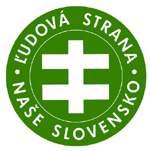
The new far right force emerging after the SNS leaving the parliament is the People's Party Our Slovakia (Ľudová strana Naše Slovensko, ĽS-NS) founded in 2010 and led by Marian Kotleba. Marian Kotleba is the former leader of the chauvinistic Slovak Brotherhood (Slovenská Pospolitost) banned by the court in 2006. The ĽS-NS is opposed to the EU and NATO membership, it holds anti-Roma prejudices, and promised to establish a far right Home Guard in the 2010 election program. The party itself could not grab any seats in the parliament reaching only 1.33% and 1.58% in the general elections of 2010 and 2012. But it’s leader, Kotleba rose to fame when he achieved a surprise victory in the regional elections of 2013 winning the Banská Bystrica region with 55.5% against the Smer candidate. Kotleba’s success can be attributed to his anti-roma marches and rhetoric, as well as anti-establishment views about the “political mafia” of the parliamentary parties. Marian Kotleba have been charged with incitement to racial hatred and endangerment of democracy on multiple accounts earlier but have not been found guilty. A poll conducted in December 2013 showed 3.7% support of the party in Slovakia.
The general elections which took place on 5th March 2016 saw the ĽS-NS gaining parliamentary seats for the first time since the party’s foundation in 2010, resulting in an unexpected emphasis on far-right extremist views in the Slovak parliament. Combined with the rising popularity of the SNS, the two parties received 16.68% of the votes with 8.04% of voters choosing ĽS-NS (14 mandates out of 150). The neo-Nazi party is likely to become a leading figure in the pursuit of an extremist pro-Russian rhetoric and popular anti-establishment claims. Party leader Marian Kotleba referred to NATO and the U.S. as 'criminal organisations', denounced Western democracies as 'dangerous' and called for a national militia to protect ethnic Slovak citizens. Kotleba talked favourably of Jozef Tiso's fascist government in the 1940s and frequently emphasized that non-Slovak people ought to be treated differently from the Slovak majority.
(Last update on 4. April, 2016)
Sources:
- Political Capital
- Financial Times: Neo-Nazi party makes an electoral breakthrough in Slovakia, March 7, 2016. Available online at http://www.ft.com/intl/cms/s/0/106fdaf2-e46e-11e5-ac45-5c039e797d1c.html
L'S-NS on the Internet:
Parliamentary elections - March 5, 2016
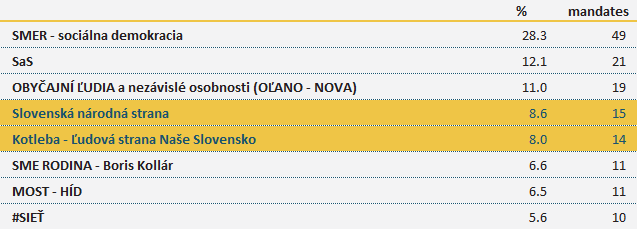

European elections - May 24, 2014
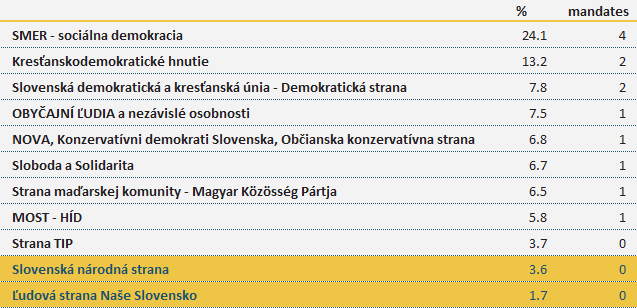

Parliamentary elections - March 10, 2012
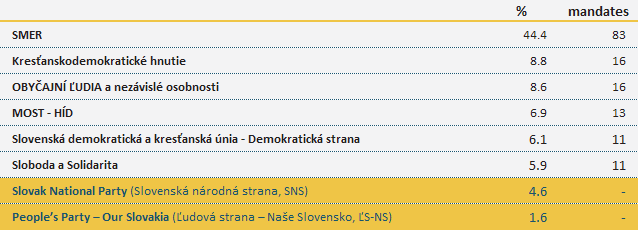

Parliamentary elections - June 12, 2010


European Parliament elections - June 7, 2009

Source: Statistical Office of the Slovak Republic; EP2014; Parliamentary2016;
Our thematic websites
Political Capital's analyses and activities in English.
Research and advocacy programme focused on the role conspiracy theorising plays in shaping populist and radical politics.
Our project New electoral system in Hungary: watchdogging, advocacy and raising awareness focuses on the electoral reform in Hungary.
Our blog on political and societal extremism and conspiracy theories.
DEREX website is supported by










